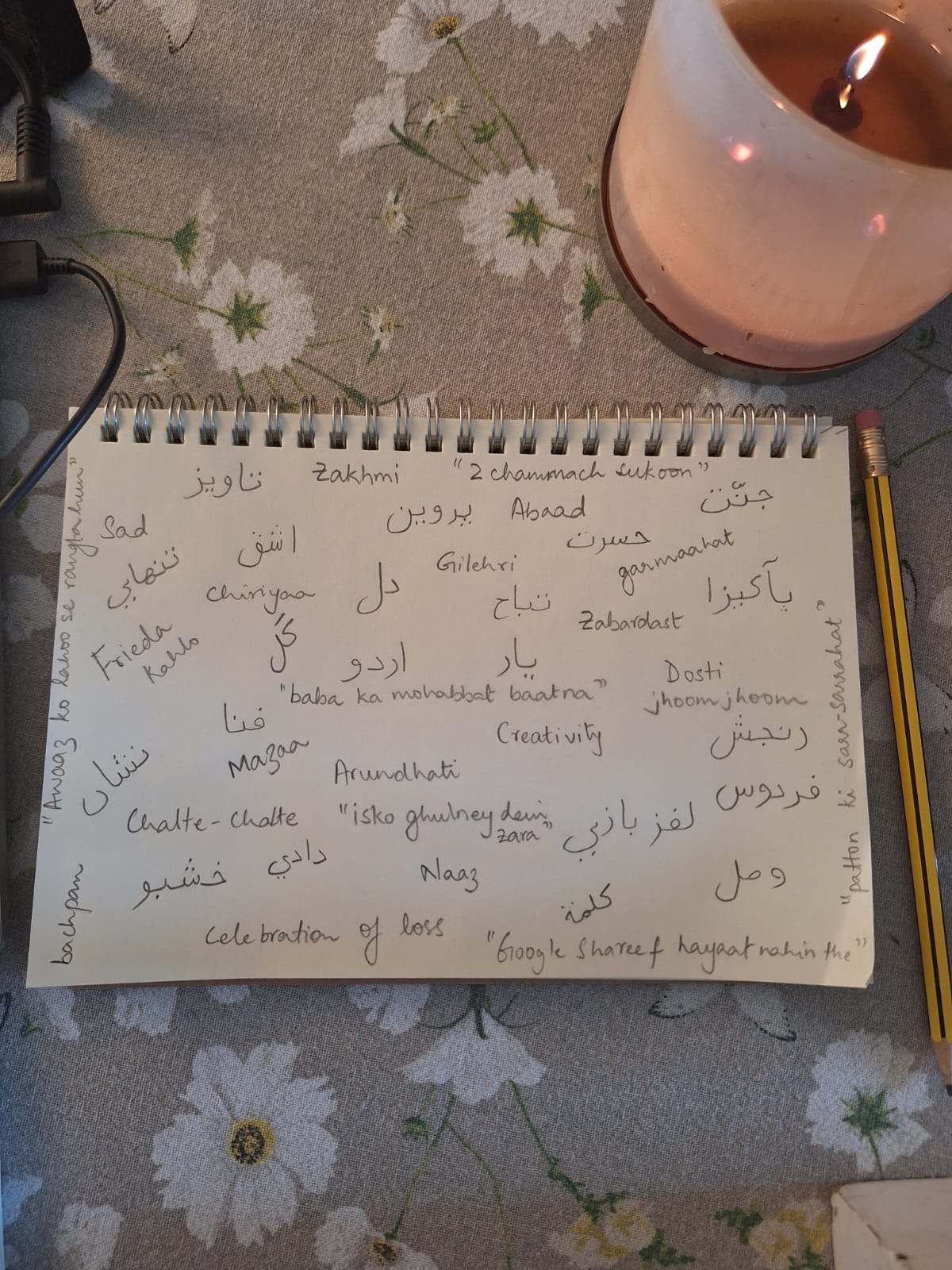Aligarh Muslim University (AMU). Abdullah Hall.
Baalon mein Parachute naariyal tel aur parrot-green dupatta se sirr dhika hua, hum kareeb 8 larkiyon ki ragging ho rahi thi. Maghrib k baad, isha se thora pehle light chali gayi. Senior larkiyon ko tafreeh sooji toh unhoney humein line mein khara kr diya.
Meri baari aayi toh intro k baad mujhse kuch urdu mein parhne ko kaha gaya. Kuch yaad nahin kya parha ya parhwaya gaya, magar nervousness mein maine ‘mizaaj’ ko ‘mijaaz’ keh diya aur sab ki hansi choot gayi. Shukr hai agle second light aa gayi aur sab apne room bhaag gaye.
Woh toh chaley gaye magar meri jo bhi thori bahot dosti thi Urdu se, woh toot gayi.
I was 17 then.
“English mein baat krne walon ki khoob khichayi hoti hai wahan,” warned an older girl who had just come to Abu-Dhabi from AMU.
While my family is from Bihar and was based in Abu-Dhabi, the majority of my friends were from South India - my friends did not speak Urdu/Hindi. We also lived in Mumbai for a few years where my friends and I spoke in Hinglish. By the time I was 8-10 years old, my go-to language for communication became English.
“Mamma, why don’t you speak with me in Urdu?” challenged my 11yo last night.
“Beta, you guys were so tiny when we got a Filipina nanny to look after you when Mamma went to work. English became a language of convenience since then.”
Not convinced, my daughter moaned, “It’s so weird to have a family who’s not English and still communicates in a language that’s not ours. It’s basic, uncultured and so whitewashed,” said my daughter who studies in a British school. “I can’t be blamed for not speaking in Urdu because that’s how I was raised,” she added with a touch of hurt and disappointment.
“Attempt a 4-min essay in Urdu on ‘Who am I”
led a session on ‘Urdu se Dosti’ along with the one and only . Every participant was assigned a two-word prompt. Mine was - Andaaz-e-bayaan, Shaandaar.With cold hands and sweaty armpits, I recite what I could write:
‘Who am I’ par poori essay likh skti hun phir bhi nahin bayaan kr skti ki main hun kaun! Urdu aur English k sahaarey, alag alag artists k alfaaz udhaar le kr, koshish krti hun kabhi kabaar bayaan karun, main hun kaun…
Kabhi Toni Morrison, kabhi Frieda Kahlo toh kabhi Arundhati Roy k shaandaar alfaaz parhti hun toh mujhe ehsaas hota hai ki main kya ho sakti thi…
Parveen Shakir ko parhti hun toh lagta hai apni auqaat se bahar jaa rahi hun. Magar kaash…aye kaash….

I’m not 17 anymore. I’m 44 now. I could write the above because
and have shattered all boundaries of language writing for me. I did not need to be ashamed of using my bastardized English, Urdu, or Hindi.As Raju Tai said during the session, Urdu woh purani dost lag rahi hai jo meri dost ki dost thi magar ab lag raha hai Urdu meri dost bhi ho skti hai.
Like
said, writing in Urdu brought back so many memories - we will be smiling for days! Here’s another bit I dared to create today for the prompt: Darakht, bachpan, shaam.Amrood ka darakht
Jamshedpur ki shaam
Cousin ki shaadi
Har taraf raunaq
Bachpan ki laparwaahi
Mummy ki blue banaarsee
Daddy ka safeyd mulmul ka kurta
Na burhaapey ki fikr
Na maut ka khauf
To borrow a line from the guru Vimal: Aaj maine urdu se dosti krne ki choti si jurrat ki hai. Aaj main phir se 17 saal ki larki ban gayi. Kya pata ye dosti kab ishq mein badal jaaye.
Write away my aawara dil!
Note: To register for the Urdu se Dosti workshop with Vimal Chitra, a poet, and a screen writer, working in Hindi film industry apply here.



I lovvved listening to this (especially the Urdu parts) in your voice! Urdu se aap ki dosti hamesha barkaraar rahe! (All the Urdu I know is from the movies 🤷🏾♂️)
Loved reading this! And keep writing in all the languages you can. All our languages, including Urdu, speak to each other beautifully and to us when we let them.